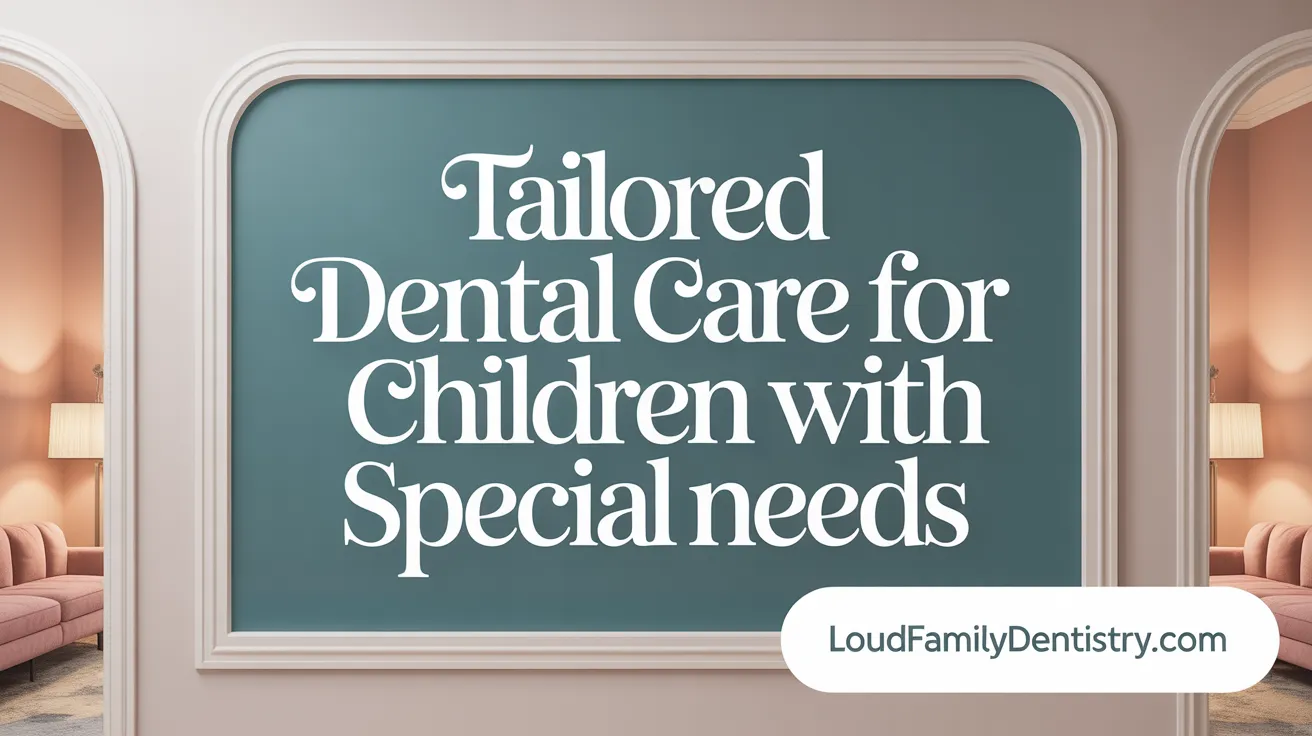Why Pediatric Dental Care Matters
Maintaining good oral health from an early age lays the foundation for a lifetime of healthy smiles and overall well-being. Pediatric dental care goes beyond treating teeth; it encompasses prevention, education, and creating a positive environment that ensures children feel safe and comfortable. This article explores comprehensive strategies to establish good oral hygiene habits, ease dental anxiety, and tailor dental care to meet the unique needs of young patients.
The Importance of Early and Preventive Pediatric Dental Care

Why is it important to maintain good oral health in children?
Maintaining good oral health in children is crucial for their overall development and well-being. Healthy teeth and gums enable children to eat properly, speak clearly, and interact socially without embarrassment. Early dental care habits, such as brushing twice daily with fluoride toothpaste, flossing when teeth touch, and regular visits to a pediatric dentist starting by age one, establish a lifelong foundation for oral health.
Preventive measures are vital because they significantly reduce the risk of cavities and other oral diseases. Techniques like applying fluoride varnish, which can prevent about a third of cavities in primary teeth, and sealing molars with dental sealants, which can prevent up to 80% of cavities, are effective in protecting children's teeth. These interventions are especially important for children in high-risk groups or communities with fluoridated water.
Furthermore, parents' own oral health and education play a pivotal role. When parents practice good oral hygiene and educate their children about the importance of dental care, they reinforce positive habits. This upbringing helps children develop a proactive attitude towards maintaining their oral health, thereby reducing future dental problems. Early, consistent, and preventive dental care ultimately fosters healthier growth, boosts confidence, and minimizes the need for invasive treatments later in life.
Establishing Good Oral Hygiene Habits From Infancy to Childhood
 Starting early with oral health practices sets a strong foundation for lifelong dental wellness. Parents can begin establishing good habits even before teeth erupt by gently cleaning infants' gums with a damp cloth after feedings. As teeth start to emerge around 6 months, introducing a small, soft-bristled toothbrush with a tiny smear of fluoride toothpaste prepares children for routine care.
Starting early with oral health practices sets a strong foundation for lifelong dental wellness. Parents can begin establishing good habits even before teeth erupt by gently cleaning infants' gums with a damp cloth after feedings. As teeth start to emerge around 6 months, introducing a small, soft-bristled toothbrush with a tiny smear of fluoride toothpaste prepares children for routine care.
Supervising and assisting with brushing twice daily until children develop the dexterity to do so effectively is essential. Typically, this involves helping until age 7 or 8, ensuring they brush all surfaces and clean their tongue and gums. Once teeth touch, flossing should be introduced and performed daily with child-friendly tools like floss picks.
Dietary considerations play a crucial role. Limiting sugary foods, juice, and snacks minimizes cavity risk. Promoting a balanced diet rich in calcium, vegetables, and cheese supports enamel strength. Avoiding bedtime bottles filled with milk or juice and discouraging thumb-sucking beyond age 5 help prevent misalignment and decay (Oral Health Tips for Children).
Making oral hygiene routines engaging can foster positive feelings towards dental care. Incorporating music during brushing, choosing favorite flavors for toothpaste, or turning toothbrushing into a game helps children look forward to these activities (Positive dental experiences for children).
Regular visits to a pediatric dentist—ideally by age one—are vital for early detection and education. Dental professionals can apply protective sealants and fluoride varnish to prevent cavities, which affect more than half of children aged 6 to 8 (Tooth decay in children).
In summary, establishing consistent, supervised oral care routines, maintaining a healthy diet, and making dental visits a positive experience are effective strategies for fostering lifelong good oral health habits in children.
Creating a Child-Friendly Dental Environment to Reduce Anxiety
 Designing a dental office that is welcoming and comfortable for children plays a crucial role in reducing dental anxiety and fostering positive experiences. Bright, cheerful decor, featuring cartoon characters or colorful wall art, helps create an inviting atmosphere that appeals to young minds. Child-sized furniture and equipment make the space less intimidating and more accessible for kids, encouraging them to feel at ease (kid-friendly dental practice, pediatric dentistry for children).
Designing a dental office that is welcoming and comfortable for children plays a crucial role in reducing dental anxiety and fostering positive experiences. Bright, cheerful decor, featuring cartoon characters or colorful wall art, helps create an inviting atmosphere that appeals to young minds. Child-sized furniture and equipment make the space less intimidating and more accessible for kids, encouraging them to feel at ease (kid-friendly dental practice, pediatric dentistry for children).
Engaging distractions are essential during dental visits. Providing toys, books, cartoons, and music gives children something to focus on, shifting their attention away from procedures and reducing fear (distraction techniques during dental visits, soothing dental visits comfort techniques). Many practices also incorporate sensory elements like calming scents or aromatherapy, which can help relax anxious children (tips for calming pediatric dental anxiety).
Friendly, approachable staff trained in effective communication techniques are vital. They use simple, positive language and involve parents in the process, which reassures children and builds trust (effective communication in pediatric dentistry, building trust with children). Parental involvement during appointments offers emotional support and helps children feel secure (parental role in pediatric oral health).
Incentives such as stickers, small toys, or certificates for bravery can motivate children and create positive associations with dental visits (positive reinforcement in pediatric dentistry, reward systems for dental visits). Overall, creating an environment that combines visual appeal, distraction, supportive staff, and parental participation forms the foundation of a kid-friendly dental practice. This approach encourages lifelong healthy habits while making dental care an enjoyable experience for children (fostering lifelong oral health habits).
Behavior Guidance and Communication Techniques in Pediatric Dentistry
What behavior guidance and communication methods are recommended for working with children during dental care?
Effective strategies for guiding children's behavior during dental visits include the use of child-friendly language in pediatric dentistry to explain procedures in a simple, non-threatening manner. The tell-show-do technique is fundamental—this involves describing what will happen, demonstrating with dental instruments using models or friendly demonstrations, and then performing the actual procedure once the child is familiar and comfortable.
In addition, the ask-tell-ask approach encourages children to express their feelings and ask questions, helping to foster a sense of involvement and control. Positive reinforcement such as praise or small rewards can significantly enhance cooperation by making the experience pleasant.
Distraction techniques are also valuable; audiovisual aids like videos or music can divert attention away from anxious thoughts. Nonverbal communication, including gentle gestures and calming body language, supports trust-building. The voice control method employs a calm, reassuring tone to guide the child's behavior.
Establishing rapport through descriptive praise and attentive listening reassures children and reduces fear. For children with heightened anxiety or with special needs, additional considerations like gradual desensitization, the use of nitrous oxide sedation, or, in exceptional cases, general anesthesia are options. These methods should always be conducted by trained professionals, with informed consent. (Behavior Guidance for Pediatric Dental Patients)
Parental involvement is crucial—parents' attitudes and support can influence a child's comfort and cooperation. A positive, trusting environment created through these techniques promotes a successful dental experience, establishing a foundation for lifelong oral health habits.
Techniques to Reduce Dental Anxiety and Enhance Comfort

What strategies and techniques are effective in reducing dental anxiety and calming children during dental visits?
Creating a positive and reassuring dental environment is essential for helping children feel comfortable. Colorful decor, bright murals, and themed rooms can make the space less intimidating.
Distraction methods, such as audiovisual aids, movies, tablet games, or interactive apps, help divert children’s attention away from procedures, reducing fear and discomfort.
Employing behavioral guidance techniques like tell-show-do, positive reinforcement, and age-appropriate explanations build trust and cooperation. Praising children for their bravery and offering rewards like stickers or small toys can motivate positive experiences.
Introducing children early to regular dental visits helps them become accustomed to the environment, which over time reduces anxiety. Using familiarization tools like social stories, picture books, and virtual tours further eases fears.
For children with more severe anxiety, sedation options like nitrous oxide (laughing gas) or oral conscious sedation are safe, controlled methods administered by trained professionals. These techniques help ensure the child's comfort, allowing for smoother procedures and establishing positive long-term dental attitudes.
Parents also play a vital role by staying calm, offering reassurance, and participating actively during visits. Their positive attitude can influence children’s perceptions, making dental care a less stressful experience.
| Technique | Description | Additional Details |
|---|---|---|
| Environment Setup | Bright colors, themed decor | Designed to make space inviting and friendly |
| Audiovisual Distraction | Movies, apps | Keeps children engaged and diverted |
| Behavior Guidance | Tell-show-do, positive reinforcement | Builds trust and encourages cooperation |
| Pre-visit Familiarization | Social stories, virtual tours | Reduces fear of unknown |
| Sedation Options | Nitrous oxide, oral sedation | Used for severe anxiety, administered safely |
| Parental Role | Stay calm, encouraging communication | Reinforces trust and eases child's nerves |
A combination of these strategies tailored to each child's needs helps create a calming dental experience, making visits less daunting and fostering lifelong positive attitudes toward dental health.
Specialized Care and Early Intervention for Children with Unique Needs

Why are early dental visits important for children, and how are approaches tailored for children with special needs?
Starting dental care early is crucial for establishing healthy habits, preventing future problems, and catching issues at the earliest stages (Early Dental Care Tips for Parents, First Dental Visit Timing, Early Dental Intervention). For most children, visiting the dentist by their first birthday or when the first tooth erupts helps them become familiar with dental environments and reduces anxiety (Starting dental care early, Early establishment of dental home).
Children with special needs—whether related to physical, mental, developmental, or sensory challenges—require specially tailored approaches. These approaches are designed to address their unique difficulties such as sensory sensitivities, communication barriers, and existing medical conditions (Specialized Dental Care for Children, Tips for keeping autistic child comfortable).
Pediatric dentists trained in special needs dentistry perform comprehensive evaluations to understand each child's health history and develop customized treatment plans (Behavior Guidance for Pediatric Dental Patients, Pediatric dental care for children 0-12 years). They often utilize visual aids, simplified explanations, and familiar objects to help children feel comfortable (Visual Aids for Pediatric Dental Care, Using visual aids in dental care).
Behavior guidance techniques, such as the tell-show-do method, are adapted to the child's developmental level and needs. For example, visual scheduling, social stories, or sensory tools like weighted blankets can ease anxiety (Tell-Show-Do Method, Behavior-management techniques for pediatric dental visits, Role-playing dental visits at home).
Sedation and other comfort accommodations are safely used when necessary, managed by experienced professionals. These options help ensure the child's safety and comfort during treatments (Sedation in Pediatric Dental Care, Safe Sedation Methods for Children).
Long-term benefits include not only improved oral health but also enhanced trust in dental care, better cooperation during visits, and overall well-being (Creating a positive dental experience, Benefits of positive dental experiences for children). Tailored pediatric dental care plays a vital role in supporting the health, development, and quality of life for children with special needs.
Building Lifelong Healthy Smiles Through Compassionate Pediatric Care
Comprehensive pediatric dental care extends beyond clinical treatment to encompass nurturing environments, effective communication, and individualized approaches that accommodate each child's unique needs. Early preventive care paired with education empowers families to establish strong foundations for lifelong oral health. By reducing anxiety through thoughtful preparation, child-friendly offices, and comfort techniques, pediatric dentists foster positive experiences that encourage consistent dental care. Specialized attention for children with special health needs further ensures equitable access to quality dental services. Ultimately, fostering comfort, trust, and cooperation in dental visits paves the way for happier, healthier children and bright smiles that last a lifetime.
